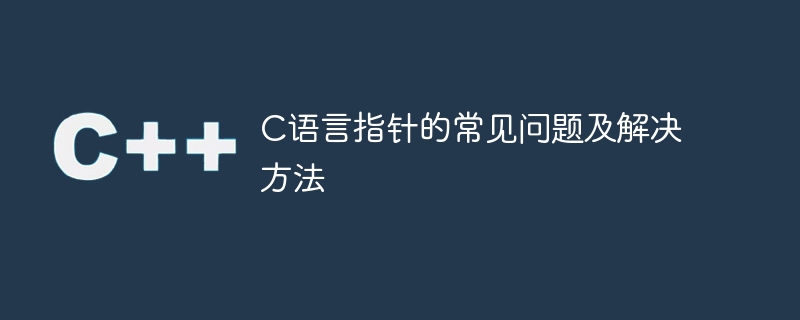

Common problems and solutions for C language pointers
Introduction:
C language is a low-level language, and pointers are one of its most important concepts. However, due to the flexibility and complexity of pointers, it is easy to cause some common problems. This article will introduce some common C language pointer problems and provide specific code examples and solutions.
1. Uninitialized pointer
Uninitialized pointer refers to the situation where the pointer variable has not been assigned an initial value. Attempting to use such a pointer may cause unknown behavior or crash. To avoid this problem, we should always assign an initial value to a pointer before using it, or initialize the pointer with NULL.
Sample code:
#includeint main() { int* ptr; // 未初始化指针 // 尝试使用未初始化指针 *ptr = 10; // 可能导致未知的行为或者崩溃 return 0; }
Solution:
#includeint main() { int* ptr = NULL; // 使用NULL初始化指针 // 使用指针之前进行判断 if (ptr != NULL) { *ptr = 10; printf("%d ", *ptr); } return 0; }
2. Wild pointer
Wild pointer means that the memory pointed to by the pointer variable is not allocated or released correctly. Or the pointer points to memory that has been released. Using wild pointers may cause your program to crash or produce unpredictable results. To solve the wild pointer problem, we need to avoid using pointers that point to unknown memory areas or freed memory.
Sample code:
#include#include int* foo() { int num = 10; return # // 返回局部变量的地址 } int main() { int* ptr = foo(); // 野指针 // 使用野指针 printf("%d ", *ptr); return 0; }
Solution:
#include#include int* foo() { int* num = malloc(sizeof(int)); // 动态分配内存 *num = 10; return num; } int main() { int* ptr = foo(); // 使用指针 printf("%d ", *ptr); free(ptr); // 释放内存 ptr = NULL; // 将指针设置为NULL return 0; }
3. Pointer arithmetic operation errors
In C language, pointers can perform arithmetic operations, such as addition and subtraction. . However, using incorrect pointer arithmetic may result in out-of-bounds pointers or erroneous memory accesses. To avoid this problem, we should always ensure that pointers are in the correct memory range for arithmetic operations.
Sample code:
#includeint main() { int arr[5] = {1, 2, 3, 4, 5}; int* ptr = &arr[0]; // 错误的指针算术运算 ptr = ptr + 6; // 越界访问 // 输出错误的值 printf("%d ", *ptr); return 0; }
Solution:
#includeint main() { int arr[5] = {1, 2, 3, 4, 5}; int* ptr = &arr[0]; // 确保指针在正确的内存范围内进行算术运算 if (ptr >= &arr[0] && ptr <= &arr[4]) { ptr = ptr + 3; printf("%d ", *ptr); // 输出正确的值 } return 0; }
Conclusion:
Pointer is an important and complex concept in C language, which can easily cause some common problems. We can reduce the occurrence of pointer-related problems by properly initializing pointers, avoiding wild pointers, and avoiding pointer arithmetic errors. When writing C programs, always pay attention to the safe use of pointers to ensure the correctness and stability of the program.
The above is the detailed content of Solve common C language pointer problems. For more information, please follow other related articles on the PHP Chinese website!




